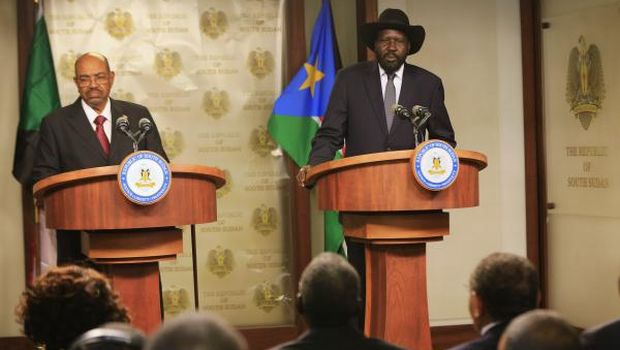
South Sudan President Salva Kiir (R) and his Sudan counterpart, Omar Al-Bashir, hold a joint news briefing in the state house in South Sudan’s capital, Juba, on January 6, 2014. (REUTERS/James Akena)
Addis Ababa, Associated Press—The president of Sudan said during a visit to former enemy territory on Monday that 20 years of war with South Sudan taught the people of his country that negotiations are the only way forward for the region.
Sudan President Omar Al-Bashir said he feared that after allowing South Sudan to hold a vote to break away from Sudan in 2011, the outbreak of violence could mean “that our huge sacrifice did not bear fruit.”
“We have come to see what we can do to stop this war knowing all too well that armed conflict would never resolve a problem and also knowing that any problem no matter how complicated can be solved at the negotiation table,” Bashir said in South Sudan’s capital, Juba.
“We fought each other for 20 years and in the end we sat and talked peace. Any further fighting is just a perpetuation of suffering for innocent civilians and loss in of lives and more destruction,” he added.
Talks in Ethiopia between representatives of South Sudan President Salva Kiir and former Vice President Riek Machar have gotten off to a slow start. Officials said at a news conference late Monday that the two sides have agreed on rules for the talks and that they will resume Tuesday.
South Sudan has seen three weeks of violence that Kiir says began as a coup attempt December 15, though Machar’s side denies the allegation. Violence began as a political dispute but has since taken on ethnic dimensions, with tribes attacking each other.
The warfare has forced an estimated 200,000 people to flee their homes in search of safety. The UN has said more than 1,000 people have died, a number that is believed to be a low estimate.
Forces loyal to Machar have been in control of two important state capitals.
Bashir flew to Juba, South Sudan’s country capital, on Monday to meet with Kiir, a meeting the southern government said “confirms the strength of our relationship.”
After decades of war, South Sudan peacefully broke away from Sudan in 2011. The two countries remain bound together by their shared oil industry. South Sudan has most of the region’s oil, but it must pump it through pipelines that run through Sudan. The outbreak of fighting is costing Sudan lost oil revenue.
Anti-government forces loyal to Machar control the town of Bentiu, the capital of oil-rich Unity State. The south’s government has said oil is no longer flowing from Unity’s fields.
Most, if not all, of the Chinese and Pakistani oil workers have left the country because of the outbreak of violence.
“We are convinced that armed conflict will only create complications that will do no good that the people (of South Sudan) must and will come back to the negotiating table,” Bashir told a news conference.
Kiir told reporters that “taking power by military force is a crime” and that Machar’s actions should be condemned by the international community.
Even as Bashir spoke of peace, reports emerged of new fighting in the Sudanese state of South Kordofan, where rebels previously aligned with South Sudan have been fighting Bashir’s government.
Ryan Boyette, an American who has lived in the region, said Monday that a journalist working for a news website he helps run reported seeing 10 destroyed off-road vehicles and two tanks belonging to Sudan’s military after weekend clashes. The reporter said he saw dozens of dead Sudanese soldiers and two dead soldiers from the rebel group, Boyette said.
The fighting is taking place on a route that runs from the Yida refugee camp in northern South Sudan along a road that helps supply the rebels, Boyette said.
Meanwhile, a security report for aid groups in South Sudan seen by AP on Monday said that fighting has been reported in Abyei, a disputed oil area claimed by both Sudan and South Sudan. The report said that eight people were killed.
